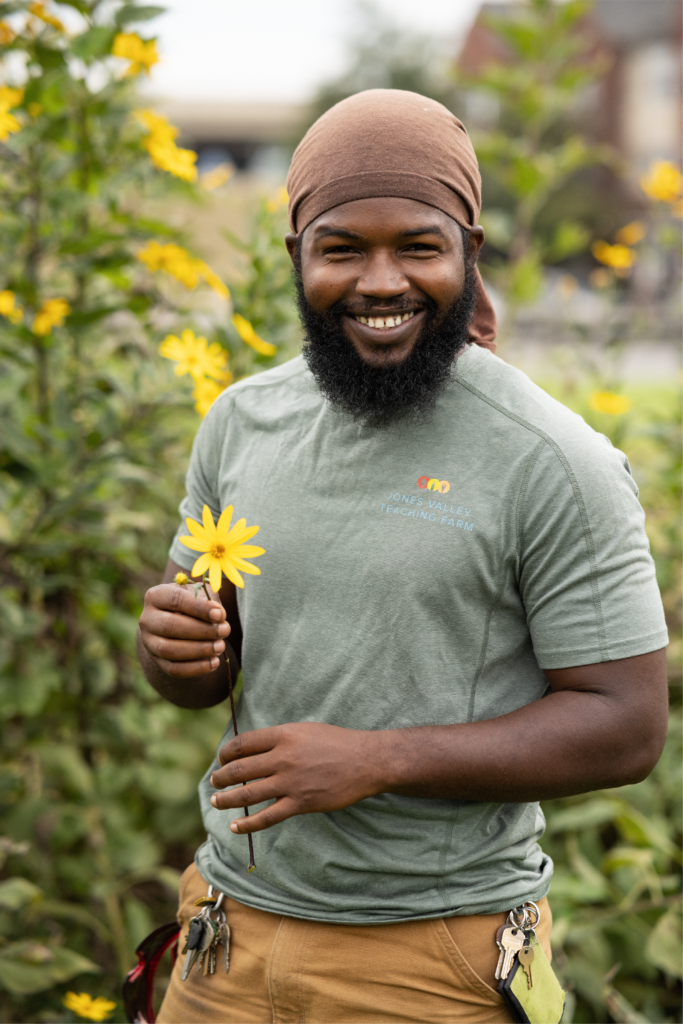MOHAMED JALLOH // PORTRAITS OF JONES VALLEY TEACHING FARM
April 14th, 2022Mohamed Jalloh
Interviewed by Katie Davis
Photography by Cary Norton
—

In 2011, Mohamed Jalloh moved from Conakry, Guinea, to Birmingham, Alabama, and began attending Woodlawn High School as a freshman. In 2014—as Jones Valley Teaching Farm began expanding our Good School Food Educational Model—Mohamed, a junior by then, was recruited with a small cohort of students to lead in the development of the JVTF Teaching Farm at Woodlawn High School. Throughout 2014 and 2015, his team of classmates worked to engage teachers, staff, and students in creating the vision, informing the design, and building the momentum for the new Teaching Farm. After graduation in 2015, Mohamed stayed connected through the final stages of construction. As the Woodlawn High School Teaching Farm began operations in 2016, and we began the search for a Farm Manager, Mohamed was the natural fit. We’ve been lucky enough to grow alongside him ever since.
Breaking ground on a new site is never easy and Mohamed approached the task with his trademark patience, optimism, and innovation. In his role, he has welcomed six classes of apprentices, mentoring over 30 students in the management of the Teaching Farm from sowing seeds to sharing the harvest. Mohamed is a tireless advocate for students, a committed community leader, a great listener, and wise advisor. He is talented, clever, curious… and you should never ever turn down a chance to eat his home cooking.
Tell me about your journey from student to a staff member with Jones Valley Teaching Farm.
It started as a student speaking on behalf of more than myself. I put myself out of the picture to be their voice instead of being my own self voice. From that experience I always wanted to stay attached even if I didn’t have the opportunity to work, you know, I always drove around and looked at the site and I knew it was something that was to come, ground would be breaking. So I was sticking around.
As I graduated and got invited to come work with Jones Valley for that summer I gave myself a title since I didn’t have a title, I called myself a floating agent because you know we worked around from other sites and mainly downtown with the mentorship of Jesse. Being able to transition from someone who has never worked with machinery…I mean, I farmed but what I have done was old school with African hoe, that hand hoe, sometimes you don’t even have a shovel or a rake. I remember a time we had only 1 rake, a 10-acre farm with only 1 rake and those hoes were the only thing that you used, that was what you raked the bed with. All my knowledge was based around only one tool, so to be able to use machinery to fill in those gaps and make my work more easy and more abundant to be able to also focus more on education. Education is a very important key for me. I try to find any educational pieces in anything I’m doing. I try to bring an educational conversation to you know to my peers, coworkers or to my students to try to make sure they are learning something. As I started to become the Farm Manager at WHS it was something I couldn’t say no to, especially because I have gained so much from Woodlawn so to have the opportunity to give back it would be selfish of me to have the opportunity to give back and say no to. If there’s something others could gain from me I have to put in my 110% for this.
Would you share something you’ve learned about yourself and learned about being a leader?
One thing I learned about myself to be a leader, I have learned to put myself out of the equation sometime. Because I realized that sometimes I look at things through my own lens most of the time which is good and sometimes it can become negative. Because I have my own guides to how I live life so sometimes I expect everyone that I’m working with to live with that. Coming in I was expecting everyone to live with those same lenses, which you know disappointed me and it affected me and the work I’m doing. I had to step back and say, I have my guide and these people have their own guide and I have to respect those people on their own guide and terminology. Respecting their choices and acknowledging theirs as theirs and mine is mine, and there is something that is ours. Have a common ground where it is ours. So to be able to distinguish that is something that I learned about myself. I’m still trying to develop into that person who has an understanding of that thin line between theirs and ours because it’s a very thin line where you confuse what’s theirs and what’s ours. And also my values are not others values and when those differ, I have to step back and say, ok is this a disrespect to my own or it’s just not theirs.
As a leader am I supposed to change that in them? I’m not 100% there but I have been working on that a lot through the last few years. There’s two sides to the coin. But there’s that middle and I want to be the person standing in that middle, instead of choosing a side. I’ve been educating myself to be a neutral person more than a positive or negative person.
What do you think is the most important thing for the high school interns to walk away from the program with?
One thing I try to instill in them is self confidence. It doesn’t matter what they do; they’ll be judged but to be confident in whatever they do and follow through with whatever they decide to do 110% and not half do it so they don’t have to be disappointed in themselves. To find success within themselves and to find approval within themselves instead of with outsiders. I want them to understand that my disapproval does not take away their approval. They have the final say so; I’m an outsider to their lives. They are the driver; they are the final decision makers so I wanna make sure they walk away from the program knowing they have the self-confidence. And the ability to lead and the ability to be their own person.
What do you want other people to know about JVTF?
I think Jones Valley is great for students to be able to use as a stepping tool to whatever they are doing next. Doesn’t have to be farming; doesn’t have to be food-related. Whatever journey they are taking, I think Jones Valley is the stepping tool for them. The skills that they learn are life skills. It doesn’t pertain to one career. It’s universal. I’m glad to be part of it and be one of those persons who instill those life skills.
